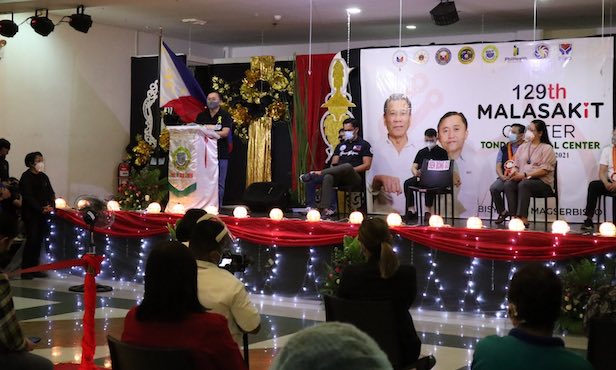Go leads launch of 129th Malasakit Center at Tondo Medical Center

Sen. Christopher Go delivers a speech at the opening of the country’s 129th Malasakit Center at the Tondo Medical Center in Manila on Friday, July 16, 2021. (Photo from his office)
MANILA, Philippines — The country’s 129th Malasakit Center, a one-stop shop for patients seeking financial aid for medical services, had its launch on Friday, July 16, at the Tondo Medical Center in Manila, with Sen. Christopher “Bong” Go leading the ceremony.
Among those who attended the ceremony were Presidential Anti-Corruption Commission Chair Greco Belgica, Undersecretary Jonjie Gonzales of the Office of the Presidential Assistant for the Visayas, Health Undersecretary Roger Tong-an, Assistant Secretary Girlie Veloso of the Office of the President, Mike Lopez (who represented 1st District Rep. Manuel Lopez), and Medical Center Director Dr. Maria Estrella.
In his speech, Go stressed, as he had in the launching of other centers, the importance of making health care more accessible to the poor.
The Tondo Medical Center, which opened in 1971, is the 26th hospital in Metro Manila and fifth in the nation’s capital to open a Malasakit Center, in addition to the Philippine General Hospital, Dr. Jose Fabella Memorial Hospital, San Lazaro Hospital, and Jose R. Reyes Memorial Medical Center.
The senator, who heads the Senate Committee on Health, acknowledged that health facilities in urban areas were generally better than those in rural areas. And yet those in the lower-income groups often could not avail of the services of such facilities.
Article continues after this advertisementAs a case in point, he recalled his experiences back as a public official in Davao City, his hometown.
Article continues after this advertisement“When President Rodrigo Duterte was still mayor of Davao City, many residents, and even nonresidents, would go to city hall to ask for aid in their treatment,” he said in Filipino. “Mondays, they would line up at PhilHealth and at the PCSO [Philippine Charity Sweepstakes Office]. They had used up their time, and they also had used up their money on fare.”
“I asked myself: Why are giving Filipinos a hard time? We in government should be the ones to go to them. It’s our responsibility to return their money in the form of faster and better service,” he added. “So when I became a senator, this was the first bill I filed along with the Salary Standardization Law that increased your salaries.”
He was referring to the Republic Act No. 11463, of which he was the principal author and sponsor. That was the law that institutionalized the Malasakit Center program.
The law streamlines the provision of medical assistance from the government by bringing together the relevant agencies under one roof — namely PhilHealth, PCSO, the Department of Social Welfare and Development, and the Department of Health.
The primary aim of Malasakit Centers is to help reduce the hospital bills of patients to the lowest possible amount by covering various patient services and expenses — such as surgeries, laboratory tests, and medicines — through medical assistance programs.
“There are still many Filipinos who don’t know about Malasakit Centers. So tell your neighbors that you now have one here in Tondo. This doesn’t discriminate against anyone. It’s your right as Filipinos to avail of its services,” Go said.
In case a patient’s medical expenses can’t be covered by PhilHealth, other agencies would pitch in, he added.
“Now, if that’s still not enough, each center has replenishable funds from the Office of the President to add to the aid. The target of Malasakit Centers is to make your hospital bills have a ‘zero balance.’ So you don’t have to pay for anything,” he said.
Go urged the administration of the Tondo Medical Center to maximize government funds in order to provide the poorest patients with the most affordable or even free medical care.
He noted the increased psychological distress experienced by patients and their families at this time and appealed for more compassion and understanding, especially for the disadvantaged.
To end his speech, Go reminded the medical community to stay vigilant against the spread of the Delta variant of COVID-19, which is said to be more contagious.
After the ceremony, Go and his personnel distributed meals, food packs, vitamins, masks, and face shields to a total of 1,125 frontline health workers.
Selected beneficiaries were given bicycles while others received new pairs of shoes. Some were also provided computer tablets which their children can use for educational purposes. Similar forms of aid were extended to 200 indigent patients.
The DSWD likewise provided 579 rank-and-file hospital employees with financial assistance in a separate distribution.